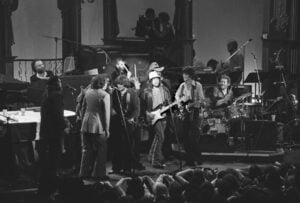On This Day in 1972: Creedence Clearwater Revival Disbanded Following the Struggles of Their Final Album
via Acoustic Rock Collection / YouTube
The Fall After Mardi Gras
On October 16, 1972, Creedence Clearwater Revival officially announced their breakup, following the disappointing reception of their final studio album, Mardi Gras. After years of chart success, internal tensions and business disputes had finally reached a breaking point.
Mardi Gras, released earlier in 1972, was a sharp departure in structure from CCR’s earlier work. It was the only album recorded after guitarist Tom Fogerty had left the band, and it featured songs written and sung by the remaining members—John Fogerty, bassist Stu Cook, and drummer Doug Clifford—in an attempt to balance contributions. While it still sold respectably—reaching number 12 on the U.S. charts and earning gold status—the album drew harsh criticism from music reviewers, including one Rolling Stone critic who called it “the worst album I have ever heard from a major rock band.”
View this post on Instagram
Conflict Over Control and Creativity
Even before Mardi Gras, fault lines were forming within CCR. John Fogerty had often held dominant control over the band’s direction, writing most of their hits and guiding artistic decisions. Meanwhile, the rhythm section—Cook and Clifford—grew frustrated with having limited creative input. As internal disputes mounted, Tom Fogerty left in 1971, signaling the unraveling of the group’s earlier unity.
To appease his bandmates, John conceded to allow them to write and sing on Mardi Gras, but the change served only to expose deeper conflicts. The band was no longer in sync, both musically and personally. Legal battles with Fantasy Records over contracts and control over song rights further strained relationships.
John Fogerty’s Later Success
After the breakup, John Fogerty embarked on a solo career, though it was slow to gain traction at first. He faced legal hurdles and a long silence before returning with the album Centerfield in 1985. That year, he scored two major hits: “Centerfield” itself and “Rock and Roll Girls.”
In interviews and retrospectives, Fogerty has often reflected on CCR’s breakup and the factors that led to it—his high level of control, band tensions, and tough record deals. Despite the acrimony, some reconciliation emerged over time. After Tom Fogerty’s death in September 1990, the surviving CCR members reorganized under the name Creedence Clearwater Revisited, separating from John but keeping the musical spirit alive for longtime fans.
The story of CCR’s split remains one of rock’s most bittersweet chapters: a band of undeniable influence undone by internal strife, creative tension, and business conflicts—all after leaving a legacy of music that still resonates today.












